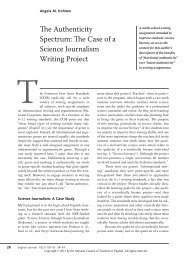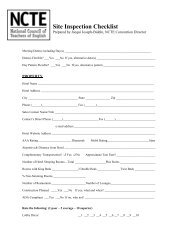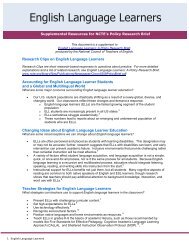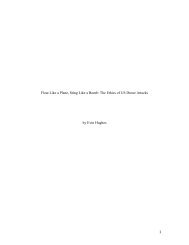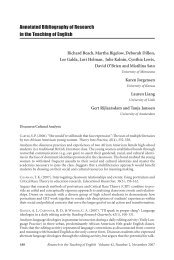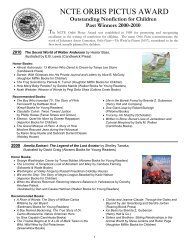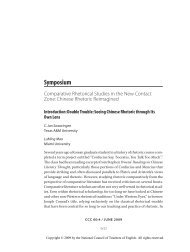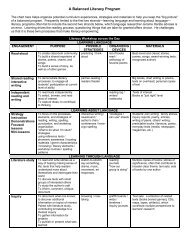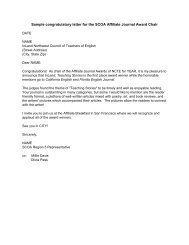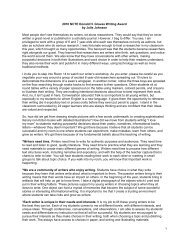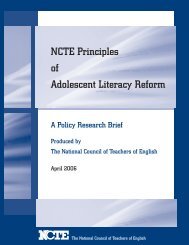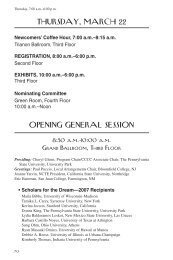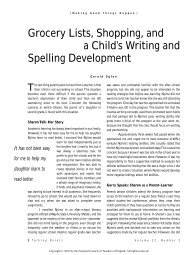Cristyn Elder - National Council of Teachers of English
Cristyn Elder - National Council of Teachers of English
Cristyn Elder - National Council of Teachers of English
- No tags were found...
You also want an ePaper? Increase the reach of your titles
YUMPU automatically turns print PDFs into web optimized ePapers that Google loves.
Using the Framework for Successin Postsecondary Writing<strong>Cristyn</strong> <strong>Elder</strong>, Purdue UniversityMargaret Munson, Arizona State UniversitySherry Rankins-Robertson, Arizona State UniversityDuane Roen, Arizona State UniversityShirley Rose, Arizona State University
This presentation was a session at the TYCA-Westconference at Mesa Community College onOctober 8, 2011.http://tycawest.org/TYCA-West serves faculty in Utah, Idaho,Wyoming, Arizona, Nevada, and Hawaii.
Three pr<strong>of</strong>essional organizations collaborated todevelop the Framework for Success inPostsecondary Writing:• <strong>Council</strong> <strong>of</strong> Writing Program Administrators• <strong>National</strong> <strong>Council</strong> <strong>of</strong> <strong>Teachers</strong> <strong>of</strong> Writing• <strong>National</strong> Writing Project
Authors & Audience <strong>of</strong> FrameworkAuthors:• faculty from two- and four-year colleges andhigh school teachersAudience:• instructors who teach writing and includewriting in their courses at all levels in all subjects• outside classroom: parents, policymakers,employers, general public
Framework for SuccessCentral premise:• Writing well is basic to student success incollege and beyond.• Writing well is central to the development <strong>of</strong> aliterate citizenry.• Writing development takes place over time withincreased opportunities to write in classes acrossthe curriculum from elementary school throughuniversity.
Context <strong>of</strong> FrameworkLanguage and ideas for the frameworkoriginated from research in:• Composition and rhetoric• Writing across the curriculum• <strong>English</strong> EducationFocus on reading, writing and ability to analyzeboth inside and outside <strong>of</strong> formal educationsituations.
Roles and ResponsibilitiesWhile responsibility for preparing students forcollege writing is shared by teachers, schools,students, and families, the documentemphasizes the role <strong>of</strong> teachers and schools.Writing assignments should be designed withauthentic purposes and audiences in mind inorder to foster flexibility and rhetoricalversatility.
Sections <strong>of</strong> the Framework• Describes the habits <strong>of</strong> mind• Uses for experiences with writing, reading,and critical analysis that serve as foundationsfor writing in college-level, credit-bearingcourses, which are based on ideas and languagefrom the WPA Outcomes Statement
Habits <strong>of</strong> MindHabits <strong>of</strong> mind refers to ways <strong>of</strong> approachinglearning that are both intellectual and practicaland that will support students’ success in avariety <strong>of</strong> fields and disciplines.The Framework identifies eight habits <strong>of</strong> mindessential for success in college writing.
Habits <strong>of</strong> Mind• Curiosity – the desire to know more about theworld.• Openness – the willingness to consider newways <strong>of</strong> being and thinking in the world.• Engagement – a sense <strong>of</strong> investment andinvolvement in learning.• Creativity – the ability to use novel approachesfor generating, investigating, and representingideas. (cont. on next slide)
Habits <strong>of</strong> Mind• Persistence – the ability to sustain interest inand attention to short- and long-term projects.• Responsibility – the ability to take ownership <strong>of</strong>one’s actions and understand the consequences<strong>of</strong> those actions for oneself and others.• Flexibility – the ability to adapt to situations,expectations, or demands.• Metacognition – the ability to reflect on one’sown thinking as well as on the individual andcultural processes used to structure knowledge.
Writing Program Administrators OutcomeStatementa set <strong>of</strong> national learning outcomes for first-yearcomposition, which include:• Rhetorical Knowledge• Critical Thinking, Reading, and Writing• Processes• Knowledge <strong>of</strong> Conventions• Composing in Electronic Environments
Rhetorical KnowledgeBy the end <strong>of</strong> first year composition, students should:• Focus on a purpose• Respond to the needs <strong>of</strong> different audiences• Respond appropriately to different kinds <strong>of</strong>rhetorical situations• Use conventions <strong>of</strong> format and structure appropriateto the rhetorical situation• Adopt appropriate voice, tone, and level <strong>of</strong> formality• Understand how genres shape reading and writing• Write in several genres
Critical Thinking, Reading, andWritingBy the end <strong>of</strong> first year composition, studentsshould:• Use writing and reading for inquiry, learning,thinking, and communicating• Understand a writing assignment as a series <strong>of</strong>tasks, including finding, evaluating, analyzing,and synthesizing appropriate primary andsecondary sources• Integrate their own ideas with those <strong>of</strong> others• Understand the relationships among language,knowledge, and power
ProcessesBy the end <strong>of</strong> first year composition, students should:• Be aware that it usually takes multiple drafts to createand complete a successful text• Develop flexible strategies for generating, revising,editing, and pro<strong>of</strong>-reading• Understand writing as an open process that permitswriters to use later invention and re-thinking to revisetheir work• Understand the collaborative and social aspects <strong>of</strong>writing processes• Learn to critique their own and others' works• Learn to balance the advantages <strong>of</strong> relying on others withthe responsibility <strong>of</strong> doing their part• Use a variety <strong>of</strong> technologies to address a range <strong>of</strong>audiences
Knowledge <strong>of</strong> ConventionsBy the end <strong>of</strong> first year composition, studentsshould:• Learn common formats for different kinds <strong>of</strong>texts• Develop knowledge <strong>of</strong> genre conventionsranging from structure and paragraphing to toneand mechanics• Practice appropriate means <strong>of</strong> documentingtheir work• Control such surface features as syntax,grammar, punctuation, and spelling.
Composing in ElectronicEnvironmentsBy the end <strong>of</strong> first-year composition, students should:• Use electronic environments for drafting, reviewing,revising, editing, and sharing texts• Locate, evaluate, organize, and use researchmaterial collected from electronic sources, includingscholarly library databases; other <strong>of</strong>ficial databases(e.g., federal government databases); and informalelectronic networks and internet sources• Understand and exploit the differences in therhetorical strategies and in the affordances availablefor both print and electronic composing processesand texts
Experiences<strong>Teachers</strong> can foster the Habits <strong>of</strong> Mind throughexperiences with Writing, Readings, and CriticalAnalysis.These experiences include developing:•Rhetorical knowledge•Critical thinking, reading, and research•Flexible writing processes•Knowledge <strong>of</strong> Conventions•Composing in Multiple Environments
ExperiencesWriting, reading and critical analysis experiencesdevelop students’• Rhetorical knowledge – the ability toanalyze and act on understandings <strong>of</strong> audiences,purposes, and contexts in creating andcomprehending texts;• Critical thinking – the ability to analyze asituation or text and make thoughtful decisionsbased on that analysis, through writing, reading,and research; (cont. on next slide)
Experiences• Writing processes – multiple strategies toapproach and undertake writing and research;• Knowledge <strong>of</strong> conventions – the formal andinformal guidelines that define what isconsidered to be correct and appropriate, orincorrect and inappropriate, in a piece <strong>of</strong>writing; and• Abilities to compose in multipleenvironments – from using traditional penand paper to electronic technologies
Analysis <strong>of</strong> Rhetorical Knowledge<strong>Teachers</strong> can help writers develop rhetoricalknowledge by providing opportunities andguidance for students to learn and practice keyrhetorical concepts such as audience, purpose,context, and genre through writing andanalysis <strong>of</strong> a variety <strong>of</strong> types <strong>of</strong> texts(nonfiction, informational, imaginative,printed, visual, spatial, auditory, andotherwise);
Engagement in Variety <strong>of</strong> Types <strong>of</strong> TextsBefore CollegeDuring CollegeCurricular(<strong>English</strong> andcross disciplinarystudies)Extra-curricular(clubs,community,family andpersonal)
Examples <strong>of</strong> Variety <strong>of</strong> Types <strong>of</strong> TextsCurricular(<strong>English</strong> andcross disciplinarystudies)Extra-curricular(clubs,community,family andpersonal)Before CollegeCreating atimeline forwomen’s suffrageWorking onschoolnewspaper;During CollegeRewriting sciencescholarship for ageneralreadershipCreating abrochure for acommunityagency
Analysis <strong>of</strong> Rhetorical Knowledge• Write and analyze a variety <strong>of</strong> types <strong>of</strong> texts toidentify▫ the audiences and purposes for which they areintended,▫ the key choices <strong>of</strong> content, organization,evidence, and language use made by theirauthor(s),▫ the relationships among these key choices andthe ways that the text(s) appeal or speak todifferent audiences
Students’ Course PortfoliosStudents use the WPA Outcomes Statement andthe Framework’s ―Habits <strong>of</strong> Mind‖ todemonstrate learning in first-year compositioncourses.A portfolio makes a claim and provides support asevidence for the claim based on the students’experiences. Portfolios include metacognitiveanalysis.
Students’ Course Portfolios• Claim: In light <strong>of</strong> the learning outcomes for thiscourse/program, here is what I have learned.• Support: To support my claim, here is evidencethat I have learned what I claim to have learned.• Reflection/Analysis/Metacognition: Also,here is what the supporting evidence reveals.• Appendices: Here are supporting materials—e.g., full projects, transcripts <strong>of</strong> peer review.
Discussion• How can we work within our institutions toincrease students’ opportunities for habits <strong>of</strong>mind and experiences with writing, reading andcritical analysis?• How can we work across institutions to increasestudents’ opportunities?• How can we work with parents and communitygroups to increase students’ opportunities?



